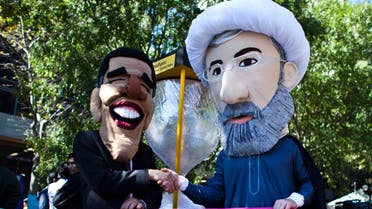2013: The year Iran warmed to the West?
Rowhani began his presidency with the intent to end an era of frosty foreign relations with the West
It has been a dramatic year for Iran: the election of reformist President Hassan Rowhani, and the signing of an interim nuclear deal after 10 years of deadlocked talks. The Islamic Republic seemed to draw closer, if only slightly, to the West.
Rowhani took up the presidency in August, and worked to end an era of belligerent rhetoric and frosty foreign relations fostered by his predecessor Mahmoud Ahmadinejad.
The former president’s “combative, controversial and provocative language… when dealing with the international community” did much to set back any possibility of productive foreign relations, Majid Rafizadeh, president of the International American Council, told Al Arabiya News.
Dr Arshin Adib-Moghaddam, director of the London-based Center for Iranian Studies, told Al Arabiya News: “Diplomacy is an art form that requires the subtle use of empathetic language. Rowhani understands that, Ahmadinejad didn’t.”
However, Dr Gary Sick, a former member of the National Security Council under U.S. presidents Gerald Ford and Jimmy Carter, said Iran’s relationship with the West had been in need of repair years before Ahmadinejad came to power.
“He just made it worse due to his belligerent rhetoric,” Sick added.
In September, the American and Iranian presidents spoke directly for the first time since 1979, if only by phone.
The 15-minute call was the first since Carter talked by telephone with Shah Mohammad Reza Pahlavi before the latter was overthrown in 1979.

U.S. President Barack Obama’s administration “attempted hard and reached out several times to Rowhani’s team… in order to orchestrate a historic handshake, but Rowhani rejected the plan because he was concerned about a backlash from hardliners at home,” Rafizadeh said.
“More fundamentally,” he added, “remarks from Supreme Leader Ayatollah Ali Khamenei indicated that he didn’t approve such an action.”
Weeks later, and after 10 years of failing to see eye to eye in negotiations, Iran and the P5+1 - Britain, China, France, Germany, Russia and the United States - signed an interim nuclear deal in November.
The agreement will see Tehran halt uranium enrichment above purities of five percent, in exchange for some $7 billion in sanctions relief.
This would keep Iran’s enrichment level well below the threshold needed for weapons-grade material, which is more than 90% enrichment.
The temporary deal, set to expire in six months, is intended to provide momentum for more sustained negotiations in search of a final, comprehensive agreement.
After a decade of fruitless talks, it seems the seeds of change were planted in 2013. There were several contributing factors, including Iran’s deteriorating economy and a change of key personalities on both sides of the negotiating table.
The time for a deal “was ripe because no one wants another war in a Muslim-majority country, and because we’re in a fortuitous position to have two rational administrations in power, both in Washington DC and Tehran,” said Adib-Moghaddam, author of “On the Arab Revolts and the Iranian Revolution: Power and Resistance Today.”
Sick said the deal presented to the P5+1 by Rowhani and his new Foreign Minister Mohammad Javad Zarif is not “something new, original and unheard of.”

Much the same deal was presented to the United States in May 2003 by the same players: Rowhani, who headed Iran’s former negotiating team, and former U.N. representative Zarif.
“What has really changed,” added Sick, “is that 10 years ago, George W. Bush was the president of the United States. He was invading countries, and was not the least bit interested in the deal, so the United States rejected the offer.
“In this case, you have Obama, who actually campaigned on the idea of engaging Iran. So you now have a conjunction of leadership on both sides that are willing to talk about it.”
Another critical factor, said Dr Geneive Abdo of the U.S.-based Stimson Center, is Iran’s weak economy.
“Because of the economic mismanagement under Ahmadinejad, the Iranians are interested in improving the economy,” she told Al Arabiya News.
“Iran is having great difficulty because its hard currency reserves have been depleted. It needs to sell its oil again on the world market, and that can only happen if sanctions are lifted.”
The United States placed Iran under sanctions in 1979, and has expanded them to target the oil, gas and petrochemical sector since then.
Sanctions also target a host of other commercial areas, including banking transactions with Iran, and the country’s flagging automobile industry.
The United Nations, and a host of countries acting independently, have also levied sanctions against Iran due to its nuclear program, which Tehran denies is geared towards building an atomic weapon.
Despite the interim accord, experts are wary of the future.
“When the more fundamental issues will be discussed in the next phase of negotiations, unresolvable challenges will emerge,” said Rafizadeh.
The ambiguous language of the interim deal allowed for a relatively easy victory, and “across Iran’s political spectrum, there is a high level of consensus that Tehran won’t give up its rights to enrich uranium,” he added.

As a result, it is likely that international concerns regarding Iran’s nuclear defiance, or the perception of the country as a nuclear threat, will remain.
Such suspicion is clear as some influential members of Congress, from both Obama’s Democratic Party and his Republican rivals, are pushing to pass laws that would tighten already-strict U.S. sanctions on Iran.
Last week, 26 U.S. senators introduced a bill to strengthen sanctions, but it was not clear when it would come for a vote, and the chamber is due to go into recess until the new year.
“The problem in Iran isn’t very different from the problem in the United States,” said Sick. “There are some hardliners in the United States who basically will settle for nothing but the unconditional surrender of Iran.”
Suspicious
Adib-Moghaddam said in Iran, there are hardliners who are “suspicious of Rowhani and his policy of engagement. This is a tango that Obama and Rowhani are dancing in a mine field. So far, they have tip-toed around it rather well.”
Rafizadeh said despite progress on the nuclear front, “the gap between Tehran’s stance on nuclear proliferation, and the P5+1 position, is too wide to bridge.”
Only time will tell if the smiling faces and celebratory hugs shared between negotiators in November are forerunners of real and lasting change.
The past year has seen a cautious change of face from Iran. However, it remains to be seen if the Islamic Republic will make sweeping changes in its foreign policy, and if this will be reciprocated across the pond.
Conservatives on both sides are wary, and leaders must tread quickly and carefully to prove that all parties can live in mutually beneficial harmony.
-

Iran dismisses Peres offer to meet Rowhani
The foreign ministry spokeswoman said her country would never recognize the Jewish ... Middle East -

Iran media: Mandela funeral could ‘trap’ Rowhani
Iranian hardline newspaper says there is a risk Islamic Republic's president could ... Middle East -

Israel’s Peres ‘ready’ to meet Rowhani
“The aim is to transform enemies into friends,” said the president, whose role in ... Middle East -

Rowhani defends Iran’s interim nuclear deal
Hassan Rowhani told students in Tehran Saturday that economic progress can’t be ... Middle East -

Iraq PM in talks on Syria during Iran trip
It is Maliki’s first visit to Tehran since Hassan Rowhani became Iran's president ... Middle East -

Rowhani: nuclear facilities ‘red line’
Iran’s president said the level of uranium enrichment will be determined by fuel ... Middle East -

Poll asks who’s more influential: Sisi, Erdogan, Netanyahu, or Rowhani?
Iranian president shows wide lead against Israel’s premier in web user poll Variety -

Rowhani: Israel isolated after Geneva deal
Israel criticized Iran’s nuclear deal with world powers as a historical ‘mistake’ Middle East -

Rowhani: Deal seals ‘nuclear right’
Rowhani reiterated his statement that Iran would “never” seek atomic weapons, ... Middle East -

Cameron makes historic call to Rowhani
The UK premier discussed with the Iranian president negotiations over Iran's ... Middle East -

The required dialogue between Rowhani and the Gulf
Iranian President Hassan Rowhani - or the “old friend,” as Al ... Opinion -

Iran’s parliament approves final Rowhani minister
Iran’s conservative-dominated parliament has approved the final remaining ... Middle East -

President Obama’s civilizing gesture
“You take credit card, right?” I tried to act nonchalant. My doctor ... World -

Obama in 2013: a credibility crisis
U.S. President Barack Obama came into office in 2008 promising to forge a ... World -

Obama threatens action in South Sudan
The threat came after four U.S. servicemen were attacked in South Sudan Africa -

Obama eyes China economic ties through new envoy
The nomination reflects the importance of advancing economic relationships with ... Economy -

Obama girls get dating advice from their watchful dad
Obama said he worries about "getting in the way of the girls just having a normal ... Variety -

Obama: South Sudan violence must end
Washington has deployed 45 troops to the African country to protect U.S. interests ... Africa -

Obama selects gay athletes for Sochi Olympic delegation
Is Obama sending a clear signal to Russia about its treatment of gays and lesbians ... Sports -

Should Obama’s Nobel Prize be revoked?
Analysis: ‘Drone wars’, Guantanamo and Syria renew questions over validity of U.S. ... Analysis

